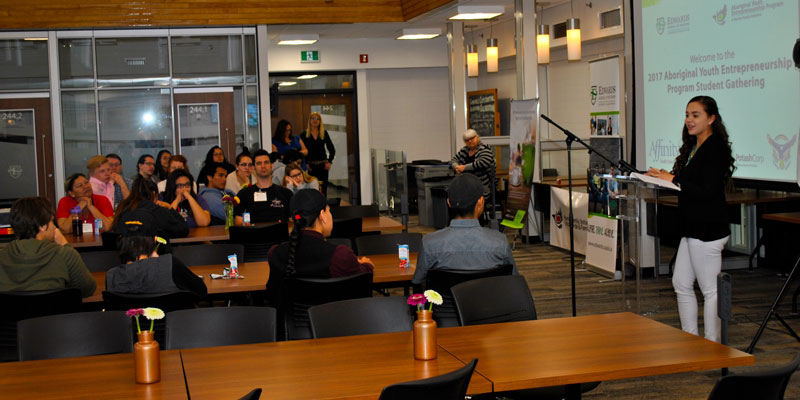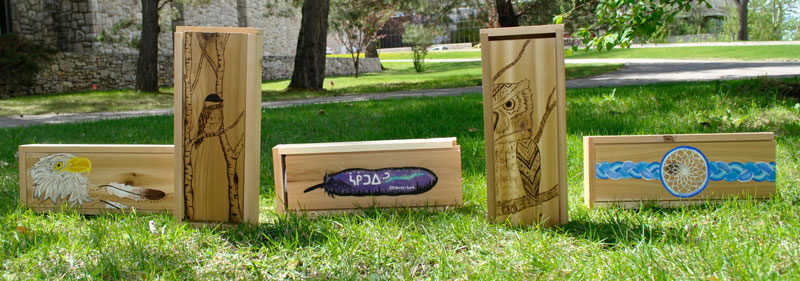
Aboriginal Youth Entrepreneurship Program participants prepare pitches at U of S
On May 10 and 11, Aboriginal youth from around the province met in Saskatoon for the second Annual Saskatchewan Aboriginal Youth Entrepreneurship Program (AYEP) gathering.
“AYEP develops personal and professional skills needed for life after high school,” said Elaine Favel, a teacher at Rossignol High School in Ile-a-la-Crosse. “The program teaches students to think outside the box and challenges them to go beyond their comfort zone.”
The Martin Family Initiative, established by former prime minister Paul Martin, launched AYEP in 2008 to introduce Grades 11 and 12 Aboriginal students to the wide range of business opportunities available within the Canadian economy.
“It is important for us to create opportunities for Indigenous Canadians as part of the essential need to continuously move the reconciliation process forward,” said the Right Honorable Paul Martin.
This past year (2016-2017) has seen AYEP achieve increased levels of Indigenous student engagement in Saskatchewan through completion, graduation and retention rates since the program launched in the province.
By expanding the boundaries of the traditional classroom, students can receive Grade 11 and Grade 12 secondary school credits through AYEP. They can also use these classes towards their admission average if they wish to attend the Edwards School of Business after high school graduation.
“AYEP is a fantastic program. It has helped students develop public speaking and presentation skills to contribute to the business world,” said Rossignol High School student Noah Dubrule. “That is what this program is designed to do; give us youth a taste of what business is.”
The annual gathering was hosted by Edwards School of Business at the University of Saskatchewan and took place on Treaty 6 Territory and the Homeland of the Metis. The gathering added a new dimension this year with AYEP students joined by the Saskatoon Tribal Council student business clubs. PotashCorp generously provided funding for the business club initiative.
Schools and First Nations present at the event included:
- Bert Fox Community School, Fort Qu'Appelle
- Charlebois Community High School, Cumberland House
- Eagleview Comprehensive High School, Onion Lake First Nation
- John Paul II Collegiate, North Battleford
- NEC Business Club, Kinistin Saulteaux First Nation
- Muskoday First Nation Youth Business Club, Muskoday First Nation
- Mistawasis Nehiyawak Business Club, Mistawasis First Nation
- Nutana Collegiate, Saskatoon
- Rossignol Community High School, Ile-a-la-Crosse
- Sakewew High School, North Battleford (teacher)
- Scott Collegiate, Regina
Students participated in two days of entrepreneurial workshops, activities, and presentations from organizations such as Square One, Office of the Treaty Commissioner, Saskatoon Tribal Council, Clarence Campeau Development Fund, Enactus, the Wilson Centre, and more.

Handcrafted feather boxes designed by Mistawasis Nehiyawak Business Club students
Over the course of the event, the business clubs put their skills into action. The services of Tasty Towne Catering, a business venture of the Kinistin Business Club students at Kinistin Saulteaux First Nation, provided catering on day two of the event. In addition, event organizers purchased handcrafted feather boxes designed by Mistawasis Nehiyawak Business Club students from Mistawasis First Nation to give out as speaker gifts.
“The University of Saskatchewan shares a commitment to the success of Aboriginal students,” said Edwards School of Business Dean Keith Willoughby. “We recognize the important role that Indigenous-owned small businesses play in contributing to the Saskatchewan economy. Our hope is to plant the seed that students can come here to study business and entrepreneurship, and they can succeed.”
The gathering also provided an opportunity for 11 students to pitch their business ideas in front of a panel of industry judges. Several of the ideas focused on providing services that are not presently available in the students’ communities. Keegan Buffin, for example, pitched opening a bowling facility that could be dual-use for the public and the school division. Another student, Mackenzie Yole, centred her idea upon creating volleyball summer camps that would utilize school gym and the beach area in Ile-a-la-Crosse. Each of the students received a $500 business start-up grant for their efforts from Affinity Credit Union.
“As a values-based financial institution we’re thrilled to work alongside the education sector and the Indigenous community in this valuable skills-building gathering,” said Mark Lane, CEO of Affinity Credit Union. “We are committed to improving business opportunities for young Indigenous people and appreciate the good work put forward in delivering this program to students. At Affinity, we believe that together, we achieve more and through this collective effort we all benefit.”
